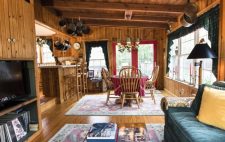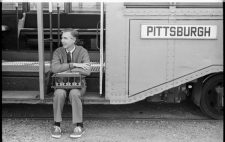Having come of age when it was neither safe nor acceptable to be openly gay, Dee, 73, kept her sexual identity a closely guarded secret throughout her life.
Grieving the recent death of her sister triggered a need to finally open up – the sorrow unleashed long ago memories of being beaten up and worse during a less tolerant era.
“I couldn’t take it,” says Dee, who sought counseling to process it all. “It took 47 years, but I finally came out with my counselor. I felt like, ‘Wow, ok, this is out now, and I can deal with it.’”
For Eve, also in her 70s, coming to terms with her identity was a long time coming.
“When I was growing up, this wasn’t something that was ever discussed,” Eve says. “The label ‘lesbian’ wasn’t out there. I didn’t understand who I was, and it was very confusing. I attended a Catholic elementary school, and my family was first-generation Americans. There were a lot of old-world beliefs. We were groomed to marry and have children, and that’s another reason I’ve stayed closeted: I was married to a man for a long time.”
Eve didn’t realize there were other men and women in South Jersey who had also lived double lives until she discovered Aging with Pride, a support group that meets on the second Friday of every month at the Katz Jewish Community Center in Cherry Hill. By making the decision to join this community of men and women, all between the ages of 52 and 91, she came out for the first time in her life.
“It took courage to go to that meeting, but once I was there, I felt so comfortable,” says Eve.
For group members, Aging with Pride is an invaluable outlet, helping them come to terms with memories and feelings they’ve long suppressed, along with dealing with general issues of aging. Talk often focuses on what it’s like getting older – dealing with isolation and loneliness, financial worries and mounting health concerns. But they also discuss identity, and what it means to grow old as a member of the LGBTQ community.
“A lot of these men and women deal with isolation and invisibility in general,” says Reva Farenback-Brateman, who runs the group for Jewish Family and Children’s Services of Southern New Jersey. “But they also feel a sense of invisibility in the LGBTQ community.”
Through Aging with Pride and another, similar group she was emboldened enough to recently join, Eve discovered that she isn’t alone: there are many other women her age who were married to men for years.
“That was welcome news, and comforting news,” she says. “It made me feel that I was more a part of a community than I’d realized.”
Farenback-Brateman was inspired to start the group last year when she met an elderly gay couple at the “memory café” she runs for dementia and Alzheimer’s patients and their spouses. “Here they were together for more than 60 years,” she says. “It just really struck me: what must it be like for them?”
The Aging with Pride group gives its members – whether they’re “out” to the rest of the world or not – a place to be themselves. Farenback-Brateman says the group is the only one of its kind in South Jersey.
Don Cook, 70, first joined the group in 2018, when it was just getting started.
“I lost my partner; he’s been gone for 20 years now. My parents are dead. The fears grow as you get older and there aren’t people there to help you,” Cook says. “I had to relocate after Hurricane Sandy, and I lost the home and the community I had.”
As a result, Cook says, he was in a dark place when he attended the first Aging with Pride meeting. Through connecting with other members, Cook has fostered friendships and built up his own confidence and willingness to confront some of his fears head-on.
“I’ve rekindled my interest in art, and now I work at an art gallery in Mount Holly,” he says. “I’ve got a friend from the group who emails me every morning, and that empowers and strengthens me.”
The group hosts frequent guest speakers to help members with everything from financial planning to advance directives. It also gives the men and women in attendance the chance to tell stories and talk about memories with people they know will understand.
“All of the things that happened when you were young start to surface,” Cook says. “You remember, because you have time to remember.”
Dee says she was beat up more than once as a teenager, even though barely anyone knew she wasn’t straight. When she was in her 20s, things got much, much worse. She was held captive by a female co-worker and her fiancé for two days, and repeatedly assaulted. Traumatized, Dee quit her job and never reported the incident to the police. She never even told her family.
Decades later, after Dee’s sister passed away, she says it was like the grief opened the floodgates.
Dee was able to share the details of what she’d been through with her surviving siblings and with her fellow Aging with Pride members. She’s found strength through talking about the horrible things that happened to her because of her sexual orientation. She’s also been buoyed by bonding with people who, like her, experienced major events in LGBTQ history firsthand.
“These people are the same as me,” she says. “We experienced the ’60s, ’70s, and ’80s, when things were so hard. We went through Stonewall, through Harvey Milk. We went through so much to get here. It’s still hard, but it’s so different now. I’ve gone through so much, but I survived, and I know who I am.”
Cook believes it’s more important than ever for older members of the LGBTQ community to be visible, to share their experiences with young people, and to show them what it looks like to “age with pride.”
“My mother used to say, ‘If you don’t have memories, you don’t have anything,’” Cook says. “I’ve been very fortunate that way. I have a million stories, and in some of them there are even lessons to be learned. Would I love everything to be perfect right now – to not have to worry about money or who lives next door? Yes, of course. But I wouldn’t change anything that’s happened. I’ve worked hard, I’ve known the rich and famous, I’ve had the most fabulous loves of my life. I wouldn’t change who I am.”
Though Eve has no intention of coming out publicly, she says the group has given her a life-changing gift.
“I feel more honest with myself,” she says. “I’m not going to go shouting it from the rooftops, but I’m not afraid anymore, and anyway, I’m the one I have to be honest with. Inside, I feel more complete. For a long time, fear kept me living in two worlds. I have too many years behind me to come out now, so things aren’t going to change much as far as that’s concerned, but I’m not afraid anymore, and that’s a wonderful feeling.”














